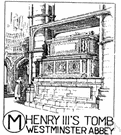Henry III
1207-1272. King of England (1216-1272) who succeeded his father, King John. His reign was disrupted by baronial opposition led by Simon de Montfort, whose representative parliament, called in 1265, is considered England's first full parliament.
American Heritage® Dictionary of the English Language, Fifth Edition. Copyright © 2016 by Houghton Mifflin Harcourt Publishing Company. Published by Houghton Mifflin Harcourt Publishing Company. All rights reserved.
Henry III
n
1. (Biography) 1017–56, king of Germany and Holy Roman Emperor (1046–56). He increased the power of the Empire but his religious policy led to rebellions
2. (Biography) 1207–72, king of England (1216–72); son of John. His incompetent rule provoked the Barons' War (1264–67), during which he was captured by Simon de Montfort
3. (Biography) 1551–89, king of France (1574–89). He plotted the massacre of Huguenots on St Bartholomew's Day (1572) with his mother Catherine de' Medici, thus exacerbating the religious wars in France
Collins English Dictionary – Complete and Unabridged, 12th Edition 2014 © HarperCollins Publishers 1991, 1994, 1998, 2000, 2003, 2006, 2007, 2009, 2011, 2014
ThesaurusAntonymsRelated WordsSynonymsLegend:
| Noun | 1. |  Henry III - son of Henry II of France and the last Valois to be king of France (1551-1589) Henry III - son of Henry II of France and the last Valois to be king of France (1551-1589)Valois - French royal house from 1328 to 1589 |
| 2. | Henry III - son of King John and king of England from 1216 to 1272; his incompetence aroused baronial opposition led by Simon de Montfort (1207-1272) Plantagenet, Plantagenet line - the family name of a line of English kings that reigned from 1154 to 1485 |
Based on WordNet 3.0, Farlex clipart collection. © 2003-2012 Princeton University, Farlex Inc.